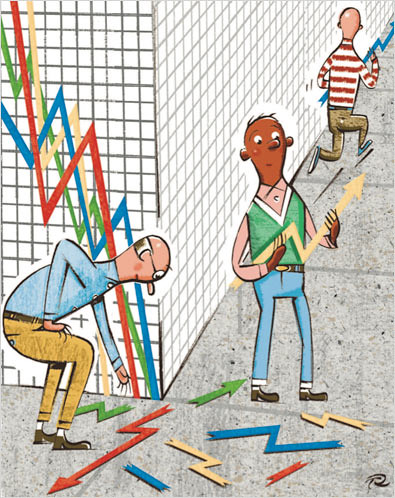Stephen Walt looks at 9 centrifugal developments rearranging the world now. Here they are in short line versions, italicized, followed by my comments:
1. The financial crisis has put the Eurozone under unprecedented stress, and the European Union's future looks increasingly bleak.
We've made EUro-pe a gift it couldn't resist, the Greek crisis. I'm not sure about the Germans' role in this, nor the French capitulation from pulling its traditionally pro-European levers. Are the Germans finally setting themselves free of the post-WWII system of checks and balances, or they've learned how to play the IMF to their advantage?
2. NATO looks more and more obsolescent.
The money has run out at the underwriting center of the alliance, while the rest have grown entitled to its benefits.
3. The Arab world is in upheaval, and seems likely to remain unsettled for years.
I wrote here that things were entering the territory of luck. I wrote elsewhere that I saw the whole thing as a measure of our despair.
4. In fact, the "Arab spring" has done nothing to improve the U.S. image in the region.
The departure of Mubarak has put many on notice, they are nervous about it and closing ranks. Thus, we pay more for gas at the pump. Sure, it's got nothing to do with current supply-demand, but the smell of gunpowder in the oil lands. The Chinese are watching.
5. There may be a mounting power struggle in Iran, but its slow march toward a latent nuclear capability continues.
Wishful thinking--Clinton should have taken the Iranian hand when we were offered; as of now, we've got no leverage with the alternative power structures there.
6. The Afghan War will end -- but not soon -- and we will leave behind a dysfunctional country, a nuclear-armed Pakistan, and a lot of people who will either be angry for us for what we did or angry at us for what we failed to do.
Not knowing when to enter, what to do, and when the get out of wars is a sign of a dysfunctional military policy. The tail wags the dog, or the military action is the best diversion each time the honchos on Wall Street and in DC run out of options.
7. Japan -- which is still the world's third largest economy -- has suffered nearly two decades of economic stagnation and a costly nuclear disaster.
Japan is going its way, they must be looking for that way as we speak. They must have loved us so much that only their inertia is keeping that door from kicking our rear ends. Common values? Let's call that for short, the world order of the dollar.
8. China continues to rack up impressive rates of economic growth -- despite some signs of strain -- and it has avoided the foreign policy sinkholes that Washington has specialized in for the past two decades.
China operates with different scales. We have not developed a sense for how they think, nor who they are. Which is quite the opposite viewed from their end. The game is theirs, and many a US friend is looking up, openly or not, for the day they can play China against the US for a better place at the table. How things are going to be sorted out in Libya is likely to be the answer of the world to come.
We have the first post WWII generation to make it into the White House and the executive offices around the country to thank for this. Small-world minded, deluded by the "world is flat" platitudes, overconfident, and self-important. They wasted most of the hard work, lessons of history, good will of the world and other national intrinsic assets, all built over many decades since the 1930s.
9. As these various problems mount, America's political institutions seem increasingly paralyzed.
This is the symptom of a country that stopped learning because the feedback supposed to help us correct and improve had been distorted by the imaginary mind games our elites indulged themselves and led everybody else into. For example, recall the idea circulated early during our Iraq invasion in the Bush administration, reality doesn't matter, what we say it is becomes reality. This was rather the expression of how detached we've become from reality, not some play on words by those funny academics feeding Bush options.
Walt opens his thoughts with Yates' poem:
Turning and turning in the widening gyre
The falcon cannot hear the falconer;
Things fall apart; the centre cannot hold;
Mere anarchy is loosed upon the world,
The blood-dimmed tide is loosed, and everywhere
The ceremony of innocence is drowned;
The best lack all conviction, while the worst
Are full of passionate intensity...
For the full text on each one of the above, follow the pointer to Walt's blog with Foreign Policy.
1. The financial crisis has put the Eurozone under unprecedented stress, and the European Union's future looks increasingly bleak.
We've made EUro-pe a gift it couldn't resist, the Greek crisis. I'm not sure about the Germans' role in this, nor the French capitulation from pulling its traditionally pro-European levers. Are the Germans finally setting themselves free of the post-WWII system of checks and balances, or they've learned how to play the IMF to their advantage?
2. NATO looks more and more obsolescent.
The money has run out at the underwriting center of the alliance, while the rest have grown entitled to its benefits.
3. The Arab world is in upheaval, and seems likely to remain unsettled for years.
I wrote here that things were entering the territory of luck. I wrote elsewhere that I saw the whole thing as a measure of our despair.
4. In fact, the "Arab spring" has done nothing to improve the U.S. image in the region.
The departure of Mubarak has put many on notice, they are nervous about it and closing ranks. Thus, we pay more for gas at the pump. Sure, it's got nothing to do with current supply-demand, but the smell of gunpowder in the oil lands. The Chinese are watching.
5. There may be a mounting power struggle in Iran, but its slow march toward a latent nuclear capability continues.
Wishful thinking--Clinton should have taken the Iranian hand when we were offered; as of now, we've got no leverage with the alternative power structures there.
6. The Afghan War will end -- but not soon -- and we will leave behind a dysfunctional country, a nuclear-armed Pakistan, and a lot of people who will either be angry for us for what we did or angry at us for what we failed to do.
Not knowing when to enter, what to do, and when the get out of wars is a sign of a dysfunctional military policy. The tail wags the dog, or the military action is the best diversion each time the honchos on Wall Street and in DC run out of options.
7. Japan -- which is still the world's third largest economy -- has suffered nearly two decades of economic stagnation and a costly nuclear disaster.
Japan is going its way, they must be looking for that way as we speak. They must have loved us so much that only their inertia is keeping that door from kicking our rear ends. Common values? Let's call that for short, the world order of the dollar.
8. China continues to rack up impressive rates of economic growth -- despite some signs of strain -- and it has avoided the foreign policy sinkholes that Washington has specialized in for the past two decades.
China operates with different scales. We have not developed a sense for how they think, nor who they are. Which is quite the opposite viewed from their end. The game is theirs, and many a US friend is looking up, openly or not, for the day they can play China against the US for a better place at the table. How things are going to be sorted out in Libya is likely to be the answer of the world to come.
We have the first post WWII generation to make it into the White House and the executive offices around the country to thank for this. Small-world minded, deluded by the "world is flat" platitudes, overconfident, and self-important. They wasted most of the hard work, lessons of history, good will of the world and other national intrinsic assets, all built over many decades since the 1930s.
9. As these various problems mount, America's political institutions seem increasingly paralyzed.
This is the symptom of a country that stopped learning because the feedback supposed to help us correct and improve had been distorted by the imaginary mind games our elites indulged themselves and led everybody else into. For example, recall the idea circulated early during our Iraq invasion in the Bush administration, reality doesn't matter, what we say it is becomes reality. This was rather the expression of how detached we've become from reality, not some play on words by those funny academics feeding Bush options.
Walt opens his thoughts with Yates' poem:
Turning and turning in the widening gyre
The falcon cannot hear the falconer;
Things fall apart; the centre cannot hold;
Mere anarchy is loosed upon the world,
The blood-dimmed tide is loosed, and everywhere
The ceremony of innocence is drowned;
The best lack all conviction, while the worst
Are full of passionate intensity...
For the full text on each one of the above, follow the pointer to Walt's blog with Foreign Policy.








